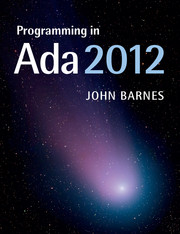Summary
This last chapter concerning the small-scale aspects of Ada is about access types. These are often known as pointer types, reference types or simply addresses in other languages and provide indirect access to other entities.
Playing with pointers is like playing with fire. Fire is perhaps the most important tool known to man. Carefully used, fire brings enormous benefits; but when fire gets out of control, disaster strikes. Pointers have similar characteristics but are well tamed in the form of access types in Ada.
This taming is done through the notion of accessibility which is discussed in some detail in Sections 11.5 and 11.6. Parts of these sections might be found hard to digest and could well be skipped at a first reading.
There are two forms of access types, those which access objects and those which access subprograms. Their type may be named or anonymous. Of particular importance are parameters of an anonymous access type. The related access discriminants are discussed in Chapter 18.
Flexibility versus integrity
The manipulation of objects by referring to them indirectly through values of other objects is a common feature of most programming languages. It is also a contentious topic since, although the technique provides considerable flexibility, it is also the cause of many programming errors and moreover, used incautiously, can make programs very hard to understand and maintain. It is worth a historical digression in order to place Ada in perspective.
Information
- Type
- Chapter
- Information
- Programming in Ada 2012 , pp. 189 - 222Publisher: Cambridge University PressPrint publication year: 2014
